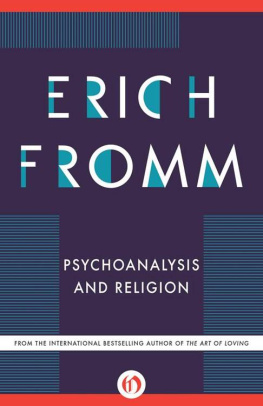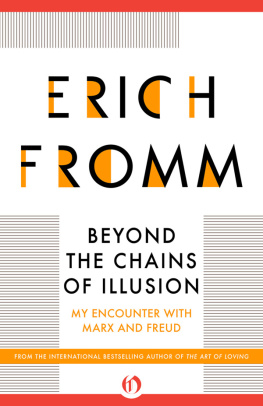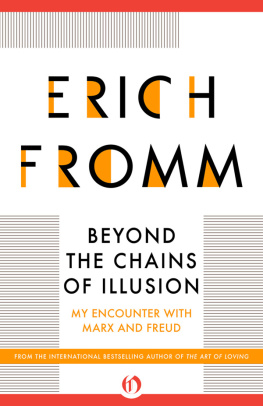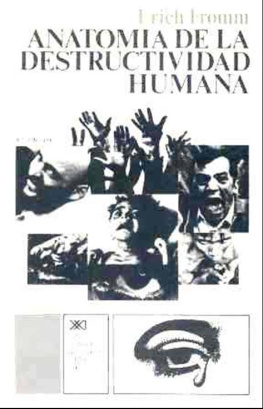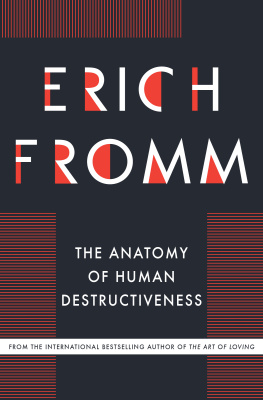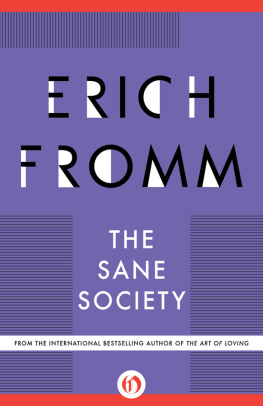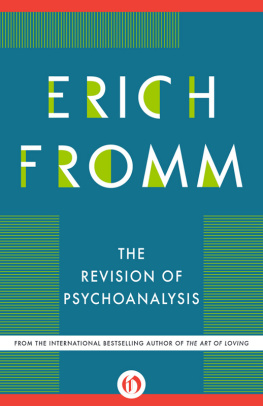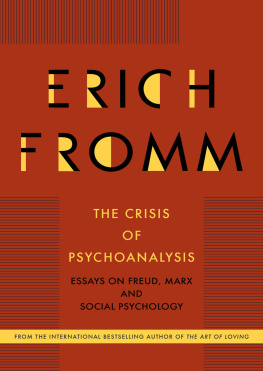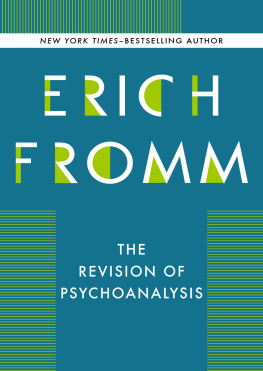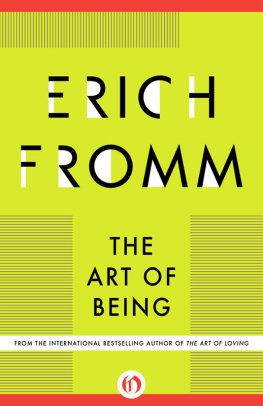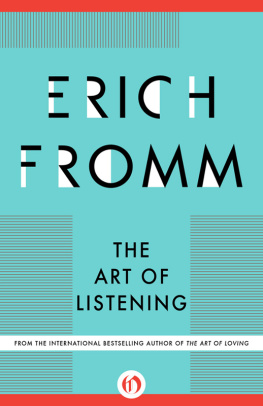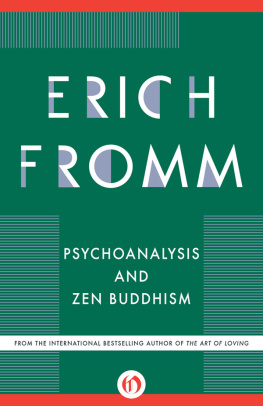Erich Fromm - Psychoanalysis and Religion
Here you can read online Erich Fromm - Psychoanalysis and Religion full text of the book (entire story) in english for free. Download pdf and epub, get meaning, cover and reviews about this ebook. City: New York, year: 1950, publisher: Open Road Integrated Media, genre: Religion. Description of the work, (preface) as well as reviews are available. Best literature library LitArk.com created for fans of good reading and offers a wide selection of genres:
Romance novel
Science fiction
Adventure
Detective
Science
History
Home and family
Prose
Art
Politics
Computer
Non-fiction
Religion
Business
Children
Humor
Choose a favorite category and find really read worthwhile books. Enjoy immersion in the world of imagination, feel the emotions of the characters or learn something new for yourself, make an fascinating discovery.
- Book:Psychoanalysis and Religion
- Author:
- Publisher:Open Road Integrated Media
- Genre:
- Year:1950
- City:New York
- Rating:3 / 5
- Favourites:Add to favourites
- Your mark:
- 60
- 1
- 2
- 3
- 4
- 5
Psychoanalysis and Religion: summary, description and annotation
We offer to read an annotation, description, summary or preface (depends on what the author of the book "Psychoanalysis and Religion" wrote himself). If you haven't found the necessary information about the book — write in the comments, we will try to find it.
Psychoanalysis and Religion — read online for free the complete book (whole text) full work
Below is the text of the book, divided by pages. System saving the place of the last page read, allows you to conveniently read the book "Psychoanalysis and Religion" online for free, without having to search again every time where you left off. Put a bookmark, and you can go to the page where you finished reading at any time.
Font size:
Interval:
Bookmark:



Contents
This can be considered as a continuation of thoughtsexpressed in Man for Himself, an inquiry into the psychology of ethics. Ethicsand religion are closely interrelated and therefore there is some overlapping.But I have tried in this book to focus on the problem of religion while in Manfor
Himself the emphasis is entirely on ethics.
The views expressed in these chapters are in no senserepresentative of "psychoanalysis." There are psychoanalysts who arepracticing religionists as well as others who consider the interest in religiona symptom of unsolved emotional conflicts. The position taken in this bookdiffers from both and is, at most, representative of the thinking of a thirdgroup of psychoanalysts.
I wish to express my gratitude to my wife not only for themany suggestions which have been directly incorporated into these chapters but,far be yond this, for what I owe to her searching and penetrating mind whichhas so greatly contributed to my own development and hence indirectly to my ideasabout religion.
E. F.
When one writes a new foreword to a book that was publishedsixteen years ago. the first question the author asks himself is whether hewill want to correct the text in any essential points that he now considers tobe erroneous. Since, during these years. my ideas have been constantly changingand, as I hope. developing, I was quite prepared in rereading the book to finda m1mber of statements I might like to change. To my surprise I found that Ifelt no need for changes in essential points and have no objection to havingthe book reprinted again as it stands.
The next question an author would ask himself is whether heshould expand on what he wrote many years earlier. The answer to this questionis definitely in the affirmative. I stressed in the text the importance ofdifferentiating between the religious thought concept and the human experiencebehind it. But I did not go far enough in describing what it is that could becalled religious experience regardless of what the thought concept may be. IfI were to write the book today I would expand the chapter on Some Types ofReligious Experience. This is not the place to do so, but there is one point Iwant to mention: for the religious person. whether he is a believer or not, lifeis a problem: the fact of having been born raises a question that man mustanswer. The most important task of his life, then, is to find an answer to thisquestion: not an answer in thought only, but an answer in his whole being, inhis way of living. For this person life is not something given which requiresno other meaning than to eat and drink, survive, have pleasure, and take partin events in accordance to one's ethical norms. He senses the profoundexistential dichotomies that beset life: that between being free-yet determined:separate-yet united: filled with knowledge-yet profoundly ignorant. He suffersfrom his feeling of separateness. His activity is directed toward finding theoptimal solution to these contradictions, while at the same time he knows thatthere is no solution: and there is no goal in life that is not subordinated tothis attempt. Here lies, in fact. the difference between the hedonistic and theethical man on the one hand. and the religious man on the other.
Rather than to yield to the temptation to continue topresent thoughts about die nature of religious experience which, even ifcorrect. must necessarily be insufficient in this context, I would point to aphenomenon which seems to make this problem particularly relevant in our time.The phenomenon I refer to is the humanist renaissance that is taking placewithin the Roman Catholic and die Protestant churches. This moment greatlystimulated by Pope John XXIII has led to a new dialogue, not only betweenCatholics and Protestants but also between theistic and nontheistic humanists.This dialogue does not proceed on the basis that its participants shouldrelinquish their respective theistic or nontheistic thought concepts. But itimplies that those involved in the dialogue must recognize that. beyond whatman consciously thinks. there exists another dimension-that of what he feels. Thisinner experience is hardly expressible in words, yet those who share the experienceknow that what they have in common is more than that which divides them becauseof differences in thought concepts.
The names of Teilhard de Chardin , Hans Kiing , and Karl Rahner are only a few of those who are representative ofthis developing humanism. The same development has occurred withinProtestantism in an even more radical form. The position I refer to has becomewell known in recent years under the concept of Godless Christianity.Dietrich Bonnhoefer , Karl Bultmann ,and, in a less radical sense, Paul Tillich are representative names for thisProtestant radical humanism.
Perhaps nothing could express the spirit of this type ofhumanism better than a sentence by Abbe Pire: What matters is not thedifference between believers and unbelievers, but between those who care andthose who do not care.'
Mexico City. March 1967
Erich Fromm
Never before has man come so close to the fulfillment of hismost cherished hopes as today. Our scientific discoveries and technicalachievements enable us to visualize the day when the table will be set for allwho want to eat, a day when the human race will form a unified community and nolonger live as separate entities. Thousands of years were needed for thisunfolding of man's intellectual capacities, of his growing ability to organizesociety and to concentrate his energies purposefully. Man has created a newworld with its own laws and destiny. Looking at his creation, he can say,truly, it is good.
But looking at himself what can he say? Has he come closerto the realization of another dream of mankind, that of the perfection of man?Of man loving his neighbor, doing justice, speaking truth, and realizing thatwhich he potentially is, an image of God?
Raising the question is embarrassing since the answer is sopainfully clear. While we have created wonderful things we have failed to makeof ourselves beings for whom this tremendous eff ort would seem worthwhile.Ours is a life not of brotherliness, happiness, contentment but of spiritualchaos and bewilderment dangerously close to a state of madness-not the hystericalkind of madness which existed in the Middle Ages but a madness akin toschizophrenia in which the contact with inner reality is lost and thought issplit from affect.
Let us consider only some of the news items which we readevery morning and evening. As a reaction to the water shortage in New Yorkprayers for rain are suggested in churches and simultaneously rainmakersattempt to produce rain by chemical means. For over a year flying saucers havebeen reported; some say they do not exist, others that they are real and a newpart of our own or a foreign power's military equipment, while others quiteseriously claim that they are machines sent from the inhabitants of anotherplanet. We are told that never has America had such a bright future as in thismid portion of the twentieth century, while on the same page the probability ofa war is discussed and scientists argue whether the atomic weapon will or willnot lead to the destruction of the globe.
People go to churches and listen to sermons in which theprinciples of love and charity are preached, and the very same people wouldconsider themselves fools or worse if they hesitated to sell a commodity whichthey knew the customer could not afford. Children in Sunday school learn thathonesty and integrity and concern for the soul should be the guiding principlesof life, while "life" teaches us that to follow these principlesmakes us at best u n realistic dreamers. We have the most extraordinarypossibilities for communication in print, radio, and television, and we are feddaily with nonsense which would be offensive to the intelligence of childrenwere they not suckled on it. It is proclaimed by many voices that our way oflife makes us happy. But how many people of these times are happy? It isinteresting to remember a casual shot in Life magazine some time ago of a groupof people waiting on a street corner for the green light. What was soremarkable and so shocking about this picture was that these people who alllooked stunned and frightened had not witnessed a dreadful accident but, as thetext had to explain, were merely average citizens going about their business.
Font size:
Interval:
Bookmark:
Similar books «Psychoanalysis and Religion»
Look at similar books to Psychoanalysis and Religion. We have selected literature similar in name and meaning in the hope of providing readers with more options to find new, interesting, not yet read works.
Discussion, reviews of the book Psychoanalysis and Religion and just readers' own opinions. Leave your comments, write what you think about the work, its meaning or the main characters. Specify what exactly you liked and what you didn't like, and why you think so.

